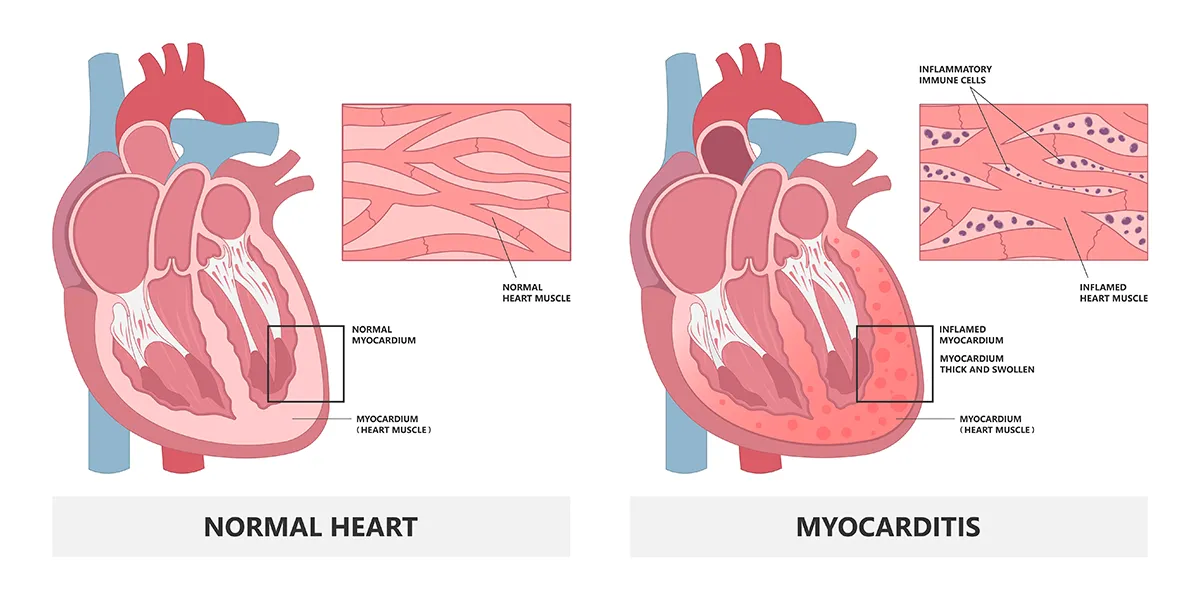Myocarditis
Find a heart specialistMyocarditis can be a serious heart condition for infants and children. Infants are particularly at risk when it happens to them. At Advocate Children’s Hospital, we have the specialists needed to help you and your family when your child needs treatment for this inflammatory heart condition.
What is myocarditis?

While mild myocarditis symptoms often go away after rest and treatment with medications, more severe myocarditis can lead to heart failure, stroke or heart attack.
Myocarditis is inflammation of muscle in the heart (myocardium). When your child has myocarditis, it weakens the heart muscle and affects the heart’s electrical system. As their heart gets weaker, it doesn’t pump blood well enough to send oxygenated blood to their body.
Myocarditis may be acute, which means it lasts for a short time. Myocarditis may also become chronic and last for more than two weeks. In extreme cases it can be life-threatening.
What causes myocarditis?
Myocarditis happens when an infection reaches the heart and causes inflammation of the heart muscle. Viral infections such as colds and influenza (flu) are most likely to cause myocarditis.
Myocarditis may also be caused by bacterial or fungal infections. Other less common myocarditis causes are allergic reactions to medicines, exposure to chemicals and having some autoimmune disorders such as lupus (systemic lupus erythematosus).
Myocarditis and COVID
COVID can be one of the viral infections that leads to myocarditis. In rare cases, myocarditis has also been seen after receiving a COVID vaccine. However, the risks of not getting a COVID vaccine still outweigh the small risk of getting myocarditis after the vaccine.
Can myocarditis be cured?
There’s no known cure or prevention for myocarditis. Prompt testing and treatment can help minimize symptoms of myocarditis. And mild cases are likely to resolve on their own.
Myocarditis symptoms
Myocarditis is rare among infants. However, it’s often more serious in infants because their immune system is immature and it’s harder for them to fight off infections that reach the heart. Some of the myocarditis symptoms they may experience are:
- Pale skin
- Difficulty with feeding
- Weakness
- Breathing problems (dyspnea)
Some infants with myocarditis may seem irritable and hard to comfort. Others may be tired and sleep more than normal when they have myocarditis.
Older children may have some of the same myocarditis symptoms as infants. In addition, they may feel fatigue or have chest pain or tightness. They may also have fever, cough, fainting, belly pain, nausea, or cold hands or feet.
Complications of myocarditis
Myocarditis can lead to stroke, heart attack, kidney failure, liver failure or heart failure. If it causes the heart to become enlarged it may lead to dilated cardiomyopathy.
Myocarditis diagnosis
There’s no specific test that can be used to diagnose myocarditis. Your child’s doctor will rely on your child’s medical history, the results of their physical exam and results of other tests to decide on a diagnosis. They will consult with other specialists for help in interpreting the results of cardiac imaging and blood tests.
Some signs and symptoms of myocarditis they may look for are:
- Rapid heartbeat
- Abnormal heart sounds
- Enlarged heart
- Fluid in the lungs
- Leg swelling (in older children)
- Signs of illness or infection such as fever or a rash
Blood tests may be done to detect infections, look for specific antibodies, or check liver or kidney function. A variety of imaging tests may be done to view the heart and other tissues such as:
- Chest X-ray
- Echocardiogram
- MRI
- CT scan
Your child’s doctor may also order cardiac catheterization to detect myocarditis and check how your child’s heart is functioning. During this procedure, a biopsy may be taken. However, biopsies may not always be accurate because the tiny piece of heart muscle may not have been taken from an inflamed area.
Myocarditis treatment
Mild myocarditis disease will sometimes go away with rest and medications. However, infants or children with serious symptoms may be admitted to the hospital for treatment.
Your child’s doctor will likely prescribe medications to support their heart function until the inflammation eases. If myocarditis is related to an autoimmune disorder such as lupus, medications to treat the underlying disease will be prescribed.
Other medications that may be used for myocarditis treatment are:
- ACE inhibitors: Reduce blood pressure so the heart doesn’t work as hard.
- Corticosteroids: Ease heart inflammation.
- Diuretics: Reduce fluid build-up in the heart.
Another myocarditis treatment is the use of intravenous immunoglobulin (IVIG) infusion. Immunoglobulins (antibodies) are separated from donated plasma and injected into your child’s bloodstream to reduce inflammation in their heart.
Devices used for myocarditis treatment
In rare cases when myocarditis affects the electrical system of the heart, devices may be implanted to support the heart:
- Implantable cardioverter-defibrillator (ICD): Provides a small shock when needed to keep your child’s heartbeat steady.
- Pacemaker: Helps regulate the heartbeat.
In very serious cases, some children need the use of extracorporeal membrane oxygenation (ECMO). This method uses a device to remove carbon dioxide from your child’s blood, add oxygen to the blood and circulate blood through their body. Not everyone is able to have this procedure and it has significant risks.
Heart transplant for myocarditis treatment
A heart transplant may be recommended when a child has severe heart damage from myocarditis. Heart transplant is recommended for 1-8% of people who have myocarditis.
What happens after myocarditis treatment?
After your child recovers from myocarditis, it’s important to follow any suggested guidelines which may include minimizing their salt intake and limiting their physical activities.
Children who’ve had myocarditis need to be monitored long-term to keep track of any changes in their condition. Myocarditis occasionally comes back, although it’s not common. Heart failure and other cardiac disorders may also occur.
Contact us
Contact us with your questions about heart care for your child. We offer second opinions.
Find an Advocate Children's heart center location near you.
Get Care
Kid-focused. Close to home. We’re here for your child in person and online.





